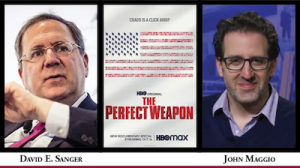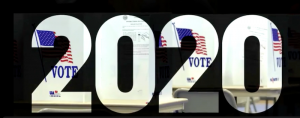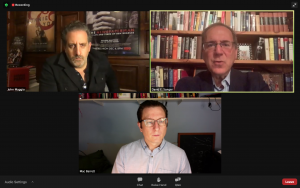
Addressing the elephant in the Zoom, David E. Sanger told his virtual audience, “we haven’t had cyberwar. We have had low-level cyber conflicts.”
Sanger, an award-winning New York Times national security correspondent, discussed foreign interference in the 2020 election as part of a webinar at The Roosevelt House in connection with the release of the HBO documentary, “The Perfect Weapon,” based upon his book of the same name.
“So far the Russians have been keeping it on the low-side during the election,” said Sanger, the author of two best-sellers on foreign policy and national security.
At a time when the country is politically divided and attention is focused on election fraud, hearing that outside interference in the presidential race might have been the balm participants needed. A majority of Americans, 69%, believe Russia tried to influence the results of the 2016 election, according to a recent poll from AP-NORC.

Disrupting elections is part of Russia’s plan, the film’s executive producer John Maggio said during the webinar. “The evolution of the Russian playbook to not just use Russian bots and drones but to recruit useful idiots in America who do their bidding,” said Maggio.
According to The Associated Press, 46% percent of all Americans disapprove of Trump’s relationship with Russia. The same study found that 55% of Trump supporters approve of the President’s dealing with Russia compared to 84% of Biden supporters who disapprove.

The concerns, both speakers explained to participants, lie in the lack of federal authority to monitor the private cyber activity to detect threats early. “Eighty-five percent of the computer traffic/the internet traffic runs through private entities and not every private entity wants the federal government including the IRS or the Military inside their networks, heck most of them don’t,” said Sanger.
Iran and Russia apprehended U.S. voter data in efforts to impede the democratic process for the 2020 election, according to a press conference by Director of National Intelligence John Ratcliffe. “It is our duty to ensure the sanctity of U.S. elections. That includes ensuring the security of voting systems. The Intelligence Community’s role is to identify threats and assess the intentions, capabilities, and actions of foreign adversaries,” said Ratcliffe.
One audience member, looking for hope from the speakers, asked, “if there was a positive way to look forward with our democracies.”
Maggio said the solution begins with a new administration that doesn’t rely on obfuscation and misinformation.
“We want to be able to have freedom in society but we also don’t want to live in the wilderness of mirrors,” said Maggio.
